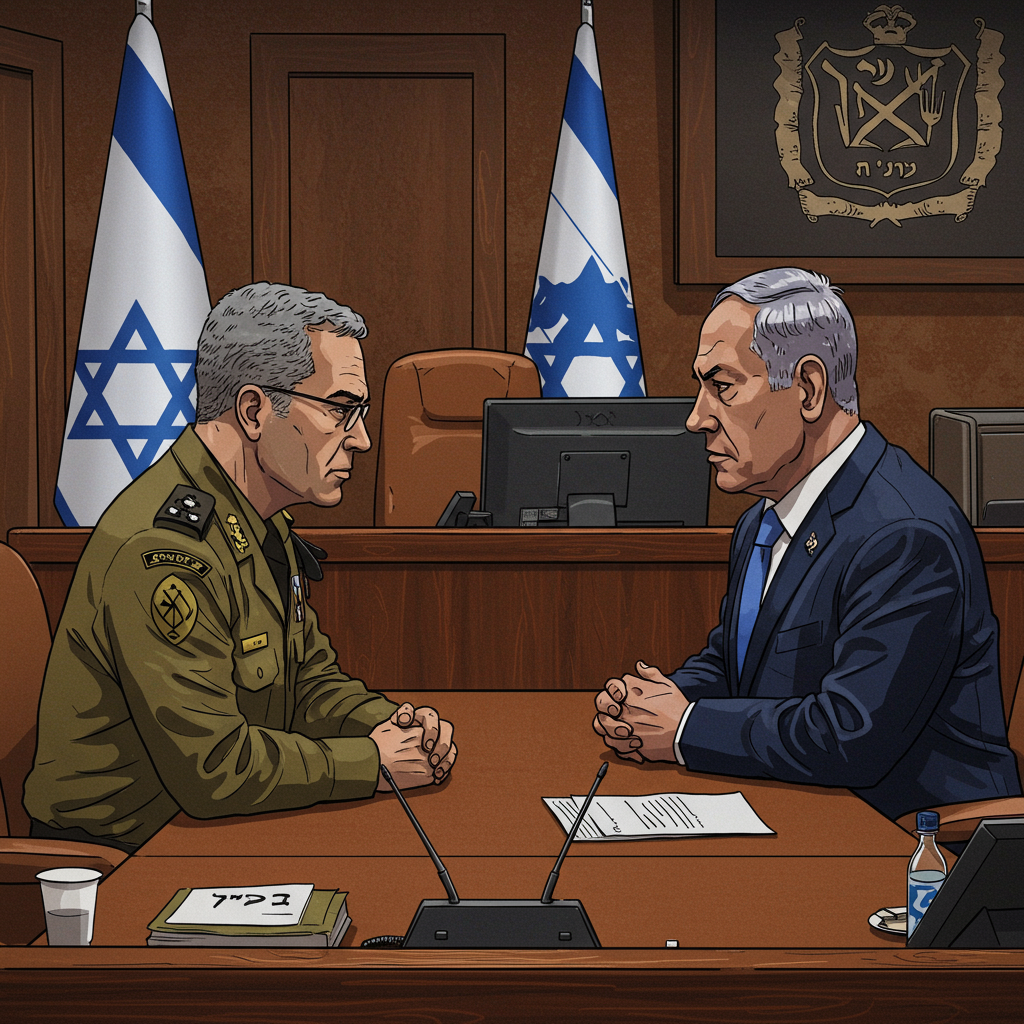The intricate landscape of Israeli politics and military strategy often sees the nation’s top leadership at loggerheads, particularly during times of intense conflict. A prime example of this complex dynamic is the ongoing tension between Prime Minister Benjamin Netanyahu and Lieutenant General Eyal Zamir, the Chief of the General Staff of the Israeli armed forces. As of August 2025, their differing views on the future of the Gaza Strip have brought this internal struggle to the forefront, highlighting the immense pressures facing Israel’s decision-makers amidst prolonged military engagements.
General Zamir, appointed to his pivotal role in January, finds himself navigating a difficult balancing act. His reported opposition to a full takeover of the entire Gaza Strip stems from serious concerns: the potential endangerment of remaining hostages held within the territory and the risk of further exhausting an already strained military. This stance places him squarely at odds with Prime Minister Netanyahu’s stated ambition for “total victory” and complete military control over Gaza. The divergent viewpoints underscore a deeper debate within Israel about the most effective path forward in a conflict that has drawn significant international scrutiny and domestic unrest.
Navigating the Strategic Divide
The core of the disagreement centers on the scope of operations in Gaza. While Prime Minister Netanyahu has publicly declared Israel’s intention to assume military control over all of Gaza, General Zamir has voiced strong reservations. During a reportedly “stormy meeting,” Zamir articulated fears that a comprehensive occupation could trap the military in an enduring, resource-intensive quagmire, further jeopardizing the lives of the roughly 50 hostages still believed to be alive. His caution reflects a pragmatic military assessment against a backdrop of the humanitarian crisis gripping Gaza. With over 61,000 Palestinians killed and most of the two million residents displaced, the human cost of the conflict remains immense, prompting global alarm and calls for a ceasefire.
Despite this internal pushback, Zamir is expected to carry out orders if a full takeover is commanded, signaling the military’s ultimate subordination to political leadership. However, his public defense of the right to voice professional military opinions – describing the culture of debate as “an inseparable part of the history of the Jewish people” – hints at the gravity of his concerns. He simultaneously emphasized the military’s capability to establish a new security reality along the border, aiming to defeat Hamas while keeping the hostages “at the forefront of our minds.”
A Career Defined by Command
Eyal Zamir’s extensive military background lends significant weight to his perspectives. Joining the armed forces in 1984, his career began in the armored corps, commanding tanks during Israel’s occupation of southern Lebanon. He rose through the ranks, eventually heading the army’s 7th Brigade and 36th Division. His tenure as head of Southern Command from 2015-2018 saw him responsible for the military’s response to the weekly protests near the security fence with Gaza, which resulted in over 150 Palestinian deaths. This period contributes to a perception among Palestinians of Zamir as an architect of devastation. One Gazan civilian, Basel, described Zamir and other Israeli leaders as “war criminals.”
Paradoxically, Zamir served as Prime Minister Netanyahu’s military secretary, a role that positioned him closely with the premier and saw him promoted to deputy head of the general staff in 2018, then to the top job early this year. This history suggests a trust that could, in theory, facilitate productive dialogue. Unlike some other high-ranking officers, Zamir was not linked to the security failures preceding the devastating October 7, 2023, cross-border assault by Hamas, a factor that might have bolstered his internal standing and public trust. Indeed, an Israeli poll revealed that while trust in Netanyahu stood at just 40%, Zamir enjoyed a significantly higher approval rating of over 68%.
The Tightrope of Leadership and Public Trust
The challenge General Zamir faces is “very complicated,” according to Michael Milshtein of the Moshe Dayan Center for Middle Eastern and African Studies. Promoting a policy he doesn’t fully endorse while maintaining the military’s operational integrity requires exceptional leadership. His command comes at a time when the Israeli military has seen significant successes, including operations against Lebanon’s Hezbollah and Iran’s nuclear program and Revolutionary Guards leadership. These actions have re-established Israel’s reputation as a dominant military force in the region, inspiring a wave of national pride.
Yet, this domestic success contrasts sharply with increasing international criticism regarding the Israeli military’s conduct in Gaza, particularly concerning civilian casualties, massive destruction, and the looming threat of famine. Zamir himself expanded the Gaza war after replacing his predecessor, Herzi Halevi, stating the intent to “break the enemy’s fighting capability.” The Israeli military currently controls approximately 75% of Gaza, a significant footprint in a territory where civilians are facing unprecedented hardship.
Conflicting Visions for Gaza’s Future
The internal Israeli debate over Gaza’s future is multifaceted. Netanyahu’s government, particularly its far-right coalition partners like Finance Minister Bezalel Smotrich, advocates for a full occupation and even the re-establishment of Israeli settlements, a stark reversal of Israel’s 2005 withdrawal. Smotrich expressed hopes for military control over the remaining parts of Gaza. Such proposals are deeply alarming internationally, with the United Nations describing them as “deeply alarming.”
An academic proposal, “Gaza Security and Recovery Program, How Should The Day After Look Like,” authored by the Israel Defence and Security Forum, outlines one vision for post-Hamas Gaza. This plan, reportedly under government review, rejects Palestinian Authority (PA) or Palestinian sovereignty in Gaza and explicitly excludes UNRWA from humanitarian aid efforts. It envisions the IDF playing a greater role in the administration of Gaza’s affairs, aligning with the far-right’s demands. This contrasts with earlier statements by Foreign Minister Gideon Sa’ar, who denied intentions for long-term control. Even former U.S. President Trump’s controversial idea of resettling Gaza’s population elsewhere has been floated, though widely condemned as a violation of international law.
The Hostage Dilemma and Domestic Pressure
The fate of the remaining hostages is a continuous point of contention and a source of immense domestic pressure on Netanyahu’s government. The Hostages Families Forum has vocally urged General Zamir to oppose further expansion of the war and called for the government to accept a deal to free the captives. Recent videos showing emaciated hostages have intensified these calls. While most previous hostage releases occurred through diplomatic negotiations, ceasefire talks collapsed in July. Hamas insists that any deal must lead to a permanent end to the war, a condition Israel views with skepticism given Hamas’s continued hold on parts of the territory.
The military’s view, as articulated by Milshtein, is that occupying all of Gaza is not technically complicated, but the subsequent responsibility for two million Palestinians would be a “very complicated” burden for the IDF. This speaks to the broader concern among Israeli generals about an open-ended conflict, requiring repeated call-ups of reserve troops and imposing governance responsibilities on a military ill-equipped for such a civilian role in a devastated enclave. The tension between military pragmatism and political aspirations for “total victory” remains a defining characteristic of the evolving situation in Gaza.
Frequently Asked Questions
Why is General Eyal Zamir at odds with PM Netanyahu over Gaza?
General Eyal Zamir opposes Prime Minister Netanyahu’s stated goal of a full military takeover of the Gaza Strip primarily due to two major concerns: the increased risk to the remaining Israeli hostages held in Gaza and the potential for further exhausting the Israeli military by miring it in a prolonged occupation. Zamir’s stance is rooted in a pragmatic military assessment of the operational challenges and humanitarian consequences of such an expanded campaign.
What are the proposed post-war governance plans for Gaza under discussion?
Several scenarios for Gaza’s future are being discussed within Israel. One notable academic proposal, “Gaza Security and Recovery Program, How Should The Day After Look Like,” advocates for economic reconstruction and “de-Nazification,” while explicitly rejecting Palestinian Authority sovereignty or a Palestinian state in Gaza. This plan also proposes excluding UNRWA from humanitarian aid. Other discussions include Netanyahu’s idea of a “security perimeter” with governance by unspecified “Arab forces,” and controversial suggestions like relocating Gaza’s population.
What are the key implications of the current disagreements between Israeli leaders and military chiefs regarding Gaza?
The disagreements between Israeli political leadership and military chiefs, particularly General Zamir and PM Netanyahu, highlight a significant tension between strategic goals and operational realities. While political leaders like Netanyahu and far-right allies push for “total victory” and full military control, military leaders express concerns about the feasibility, humanitarian impact, and long-term burden of occupying a devastated territory with a large civilian population. This internal conflict creates uncertainty regarding future actions in Gaza, impacts domestic public trust, and shapes international perceptions of Israel’s war conduct.
Conclusion
The ongoing strategic standoff between Lieutenant General Eyal Zamir and Prime Minister Benjamin Netanyahu underscores the profound challenges facing Israel as it navigates the protracted conflict in Gaza. While Netanyahu’s government pursues a vision of complete military dominance, Zamir’s military and ethical concerns regarding hostage safety and troop endurance introduce a critical counter-narrative. This internal debate, played out against a backdrop of severe humanitarian crisis and intense international scrutiny, will undoubtedly shape the future trajectory of the Gaza Strip and the broader geopolitical landscape of the Middle East. The resolution of this tension will be pivotal in defining both Israel’s military doctrine and its post-conflict vision for the besieged Palestinian enclave.




